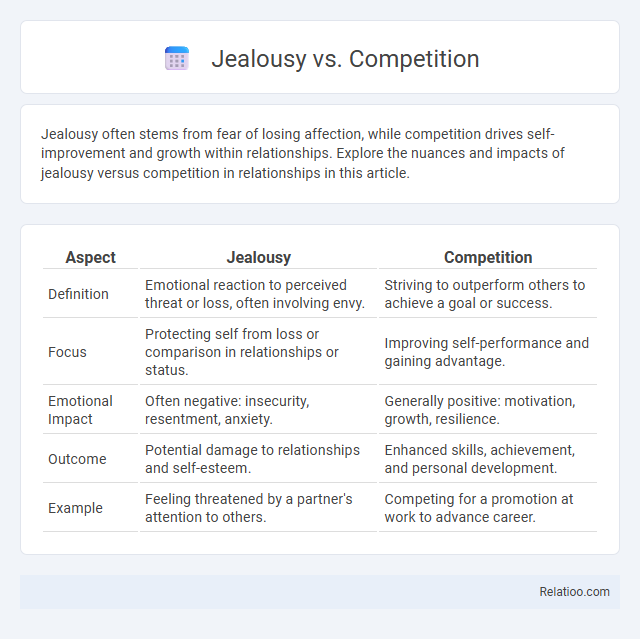Jealousy often stems from fear of losing affection, while competition drives self-improvement and growth within relationships. Explore the nuances and impacts of jealousy versus competition in relationships in this article.
Table of Comparison
| Aspect | Jealousy | Competition |
|---|---|---|
| Definition | Emotional reaction to perceived threat or loss, often involving envy. | Striving to outperform others to achieve a goal or success. |
| Focus | Protecting self from loss or comparison in relationships or status. | Improving self-performance and gaining advantage. |
| Emotional Impact | Often negative: insecurity, resentment, anxiety. | Generally positive: motivation, growth, resilience. |
| Outcome | Potential damage to relationships and self-esteem. | Enhanced skills, achievement, and personal development. |
| Example | Feeling threatened by a partner's attention to others. | Competing for a promotion at work to advance career. |
Understanding Jealousy: Definition and Origins
Jealousy arises from the fear of losing something valuable, often triggered by perceived threats to personal relationships or achievements, and is deeply rooted in evolutionary psychology as a survival mechanism. Unlike competition and rivalry, which are driven by external challenges and ambitions to outperform others, jealousy is an internal emotional response centered on insecurity and possessiveness. Understanding jealousy involves recognizing its origins in attachment theories and social comparisons, highlighting the complex interplay between self-esteem and interpersonal dynamics.
Defining Competition: Purpose and Mechanisms
Competition drives individuals or groups to outperform others by striving for a shared goal, fostering innovation and growth through structured challenges. Your success depends on understanding competition's purpose: to motivate improvement without malice, contrasting with jealousy's emotional resentment and rivalry's often personal animosity. Mechanisms such as rules, rewards, and benchmarks channel efforts constructively, ensuring fair play and measurable progress.
Psychological Roots of Jealousy
Jealousy originates from the fear of losing something valuable, often rooted in insecurity and attachment issues within your personal relationships. Unlike competition, which motivates self-improvement by comparing abilities, jealousy stems from emotional threats and perceived betrayal. Rivalry involves ongoing contests for superiority, but jealousy triggers intense emotional responses tied to possessiveness and self-worth concerns.
The Positive Side of Healthy Competition
Healthy competition fosters personal growth by motivating you to improve skills and achieve goals while maintaining respect for others. It creates a positive environment where rivalry pushes individuals to innovate and excel without breeding resentment or jealousy. Embracing competition constructively enhances teamwork, resilience, and a shared commitment to success.
Key Differences: Jealousy vs Competition
Jealousy involves a personal feeling of insecurity or fear of losing something valuable to oneself, often triggered by a perceived threat to a relationship or status, while competition is an external challenge where individuals or groups strive to achieve a goal or outperform others. Jealousy is emotionally driven and centers on possessing or maintaining what one already has, whereas competition motivates improvement and goal attainment through comparison and contest. Understanding these distinctions highlights jealousy as an internal emotional response and competition as an external process focused on achievement and performance.
Impacts on Relationships and Social Dynamics
Jealousy often triggers emotional insecurity and mistrust in relationships, leading to increased conflict and diminished communication quality. Competition can motivate personal growth and innovation but may also foster resentment and rivalry when perceived as zero-sum, disrupting social cohesion. Rivalry, characterized by ongoing opposition, intensifies social tension and polarization, potentially fracturing groups and undermining collaborative efforts.
Jealousy in the Workplace: Challenges and Solutions
Jealousy in the workplace often stems from perceived unequal recognition, creating tension that undermines team cohesion and productivity. Your leadership can address these challenges by fostering transparent communication and promoting a culture of appreciation where individual contributions are acknowledged fairly. Implementing conflict resolution strategies and encouraging professional development helps transform jealousy into motivation, enhancing overall workplace harmony.
Competitive Environments: Benefits and Risks
In competitive environments, jealousy can undermine team cohesion and reduce overall performance by fostering resentment and distrust. Competition drives innovation and productivity by motivating individuals to improve their skills and achieve goals, but excessive rivalry may lead to unethical behavior and burnout. Balancing healthy rivalry with collaboration enhances creativity and maintains workplace morale, ultimately supporting sustainable success.
Transforming Jealousy into Motivation
Jealousy often arises from comparing oneself to others, but transforming this emotion into motivation can fuel personal growth and achievement. By redirecting jealous feelings into competitive energy, individuals can set clear goals and pursue improvement rather than resentment. Understanding the difference between jealousy, competition, and rivalry allows for a healthier mindset focused on self-development and constructive challenge.
Navigating Both Emotions for Personal Growth
Navigating jealousy, competition, and rivalry requires understanding their distinct emotional triggers and potential impacts on your mindset. Jealousy often stems from insecurity, while competition and rivalry can motivate goal-oriented behavior and personal achievement when managed healthily. Channeling these emotions constructively enables you to foster resilience, enhance self-awareness, and transform challenges into opportunities for personal growth.

Infographic: Jealousy vs Competition
 relatioo.com
relatioo.com